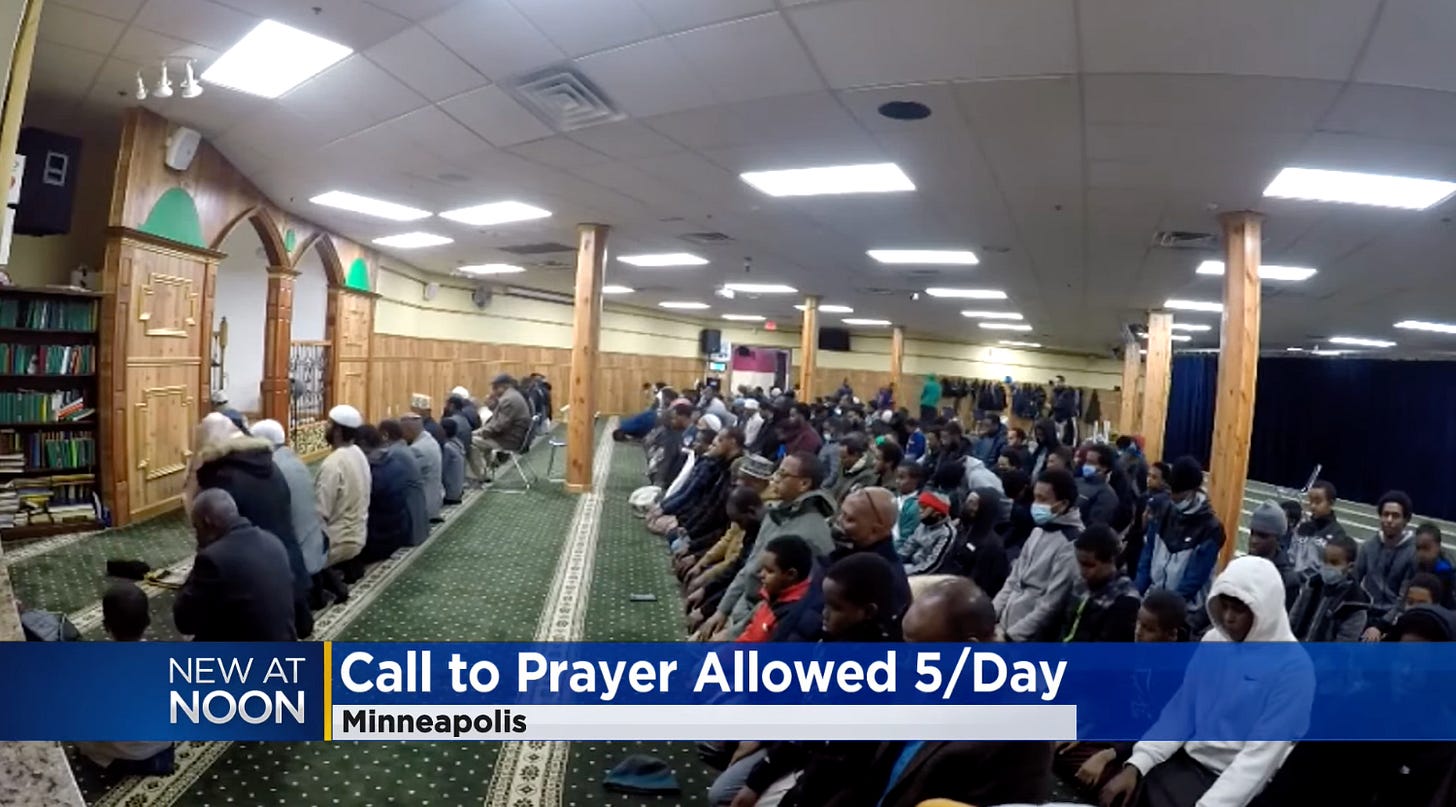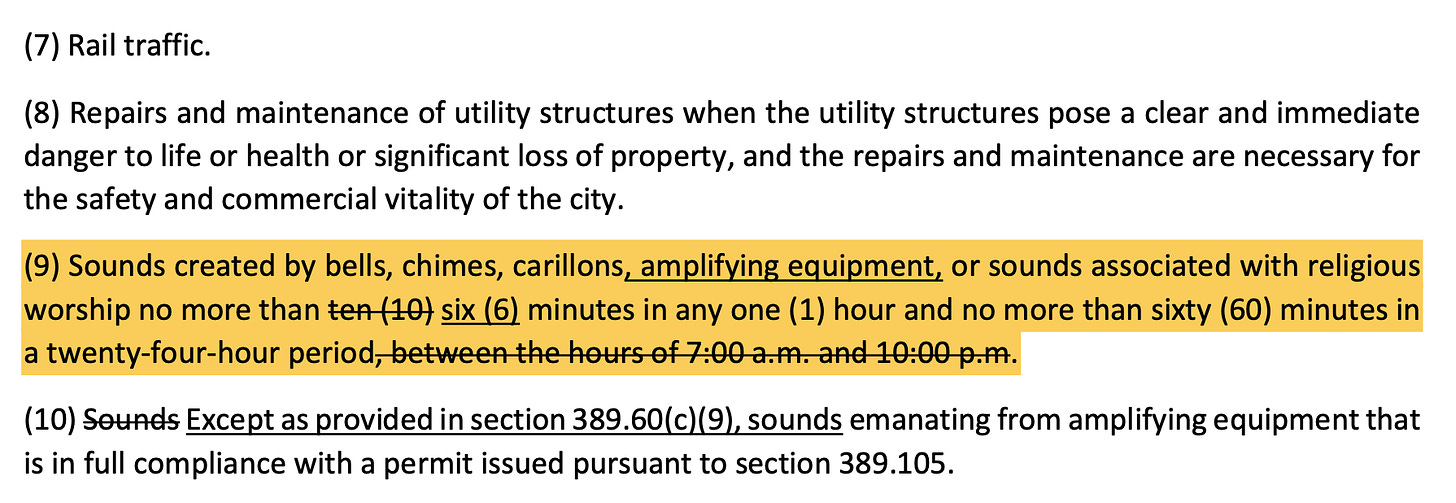Minneapolis will let Muslims amplify calls to prayer at all hours. It's a mistake.
It's absurd to give one religion the ability to create noise pollution before dawn
This newsletter is free, but it’s only able to sustain itself due to the support I receive from a small percentage of regular readers. Would you please consider becoming one of those supporters? You can use the button below to subscribe to Substack or use my usual Patreon page!
Minneapolis has become the first city in the country to allow broadcasts of the Muslim call to prayer over loudspeakers at any time of the day, opening the door for a larger debate about how far religious accommodations ought to go.

The city’s previous noise control ordinance prohibited sounds that were 10 decibels over the “ambient noise level” during the day and 5 decibels over at night. Basically, you couldn’t be too loud in public spaces. Makes sense.
There were exceptions to the rule, though, including the University of Minnesota’s athletic events and motor vehicles. When it came to religious worship, the city allowed bells or chimes to ring no more than 10 minutes per hour and no more than one hour per day—all between 7:00 a.m. and 10:00 p.m. Loudness might be acceptable… but only in certain cases and only when people were awake.
The new ordinance broadens that exemption specifically to benefit Muslims. It also permits the use of “amplifying equipment” and removes the time restrictions altogether.
That means the calls to prayer (adhan) from the Dar al-Hijrah mosque, which are broadcast five times a day during the month of Ramadan and begin as early as 3:30 a.m. during the summer solstice, will now be part of the city’s soundtrack.
When this request was first made in 2020, during the pandemic, there was arguably a good reason to grant an exemption:
“We wanted to touch those individuals who frequent this mosque and this community,” [Jaylani Hussein, the executive director of Minnesota’s Council on American-Islamic Relations] said. “If we cannot be physically together, at least this echo, this voice, this call to prayer can be an extension of us being together at this difficult time. To give some people some solace.”
Last year, the city council allowed the amplified calls to prayer to resume, but only within the 13-hour window when most people were awake.
Those sensible restrictions are now gone. The revised ordinance was adopted last week on a 12-0 vote, with three Muslim council members pushing for the change. The new rule will apply to nearly two dozen mosques all over the city, which is undoubtedly good news for most of the Somali Muslim immigrants who live in Minneapolis. But while the ordinance also applies to churches and synagogues, it’s not like Christians and Jews were itching to change the rules.
On one hand, it’s nice to see progressive politicians go out of their way to support the desires of an often ignored and maligned religious minority.
On the other hand… people want to sleep.
The Minneapolis Star Tribune published an editorial last week celebrating the impending move, saying it was a “call to inclusion”:
One need not be Muslim to appreciate the beauty of the call to prayer, any more than one must be Christian to enjoy the peals of church bells on Sunday mornings. Such sounds enhance the quality of city life, reminding residents of the rich blend of beliefs and ethnicities that come together here.
Hopefully, such a soundscape also reinforces the perception that these different communities are not visitors but full-fledged residents of the city. "It's a sign that we are here," said Yusuf Abdulle, of the Islamic Association of North America, quoted by the Associated Press.
That’s a horrible defense of a bad policy. The issue isn’t that sounds from a mosque will be heard alongside bells from a church; it’s that sounds from a mosque will be allowed to break the silence before the sun comes up, and the law was changed specifically to make that possible.
In 2020, the Freedom From Religion Foundation wrote a letter to Mayor Jacob Frey warning him that this was a blatant violation of church/state separation.
While FFRF certainly supports the city’s desire to provide comfort for Minneapolis’ Muslim community during this time of crisis, the exemption from the city’s noise control ordinance impermissibly favors Islam over all other religions. Allowing one religious group to blast its religious message very early in the morning onward violates Minneapolis’ noise ordinance, which is a reasonable restriction meant to foster a peaceful, quiet community with a well-rested population, FFRF emphasizes.
…
Minneapolis’ noise ordinance is a reasonable restriction meant to foster a peaceful, quiet community with a well-rested population. It is a neutral and generally applicable statute. Religious calls to prayer should not be exempt.
Now FFRF is reissuing that warning and pointing out that there’s nothing stopping evangelical Christians (for example) from blasting out religious messages or worship music at ungodly hours:
The city of Minneapolis seemingly believes that this change “ensures equal access for all people” and that it “benefits people of all faith,” but this is not the case. Allowing religious organizations a special carve out from Minneapolis’ noise ordinance, which is a reasonable restriction meant to foster a peaceful, quiet community with a well-rested population, is the opposite of equal access. It privileges one religious group’s messages above all others, and all religious messages over any nonreligious speech…
“The Establishment Clause of the First Amendment prohibits the government from privileging religious messages,” FFRF Staff Attorney Chris Line reminds Minneapolis Mayor Jacob Frey. “The Supreme Court has said time and again that the ‘First Amendment mandates government neutrality between religion and religion, and between religion and nonreligion.’”
It’s hard to disagree with that. The Supreme Court, in recent years, has said that any laws that apply to secular groups can’t discriminate against religious groups. If a state offers tuition dollars for private schools, they can’t prohibit private religious schools from taking advantage of the program. But this new exemption is a rule that specifically benefits religious groups (and one religion in particular) at the expense of secular groups and the general public’s desire for peace and quiet.
While the sentiment is appreciated, this could be a disaster in the making.
At a time when religious conservatives have used their political power to shove Christian beliefs on their constituents, the proper pushback needs to be religious neutrality, not giving a different faith the ability to annoy everyone else.
The old noise ordinance worked fine. It applied to everyone. There was no reason to modify it, especially where there’s plenty of technology—an alarm clock and Zoom, robocalls, radio, etc.—to avoid waking up non-Muslims.
We could all use more religious tolerance these days. It doesn’t need to come in the form of a rubber stamp for one group in particular.



I grew up across the street from a Catholic church- and a fairly large one, at that. The bell tower made it the tallest building in that part of town, and I'm pretty sure it was the highest point by elevation because all the taller buildings were downhill from it, although I'd have to check a detailed survey map to be sure (and fuck that- this is just a throwaway anecdote, after all). The sound 𝘤𝘢𝘳𝘳𝘪𝘦𝘥, is what I'm saying. You could hear it to the edge of town, and while we weren't big enough to call ourselves a city, this was a 𝘣𝘪𝘨 town. Big enough that, for most of its existence until very recently, it was actually 𝘵𝘸𝘰 towns.
You can imagine how loud that shit was from across the damn street.
They rang the bells every hour, on the hour, from 8 in the morning 'til 8 in the evening, and twice as long and loud at noon.
Now, this wasn't all that big of a problem on weekdays. Since school started at the ass-crack of dawn, and the first bells didn't ring until 8:00, us kids were drowsily ignoring the daily fascist flag fellation halfway across town in our first period classes while the local establishment of the Raping Children Cult was holding their first single-instrument concert of the day. Monday through Friday, we only had to listen to the evening performances, and that was bad enough. This being before the proliferation of DVR and streaming services, there was no pause button or closed captioning for the TV, so whatever program we were watching would just lose a minute or so of content every hour. Conversations routinely got suspended for the duration. Mixtapes had to be rewound so the song that got bell-ed over could be played again. You get the idea.
Weekends, however...
As a teenager, the most glorious thing in the world was surviving five whole days of high school hell and reaching the weekend... but thanks to Holy Motherfucking Church's need to remind everyone on the bloody planet of its existence multiple times a day, sleeping in on Saturday was a virtual impossibility. Not even with earplugs. 𝘛𝘩𝘦 𝘧𝘶𝘤𝘬𝘪𝘯𝘨 𝘩𝘰𝘶𝘴𝘦 𝘴𝘩𝘰𝘰𝘬. The sound bounced off the building next door and rattled the windows. The best we could manage was to wake up, blaspheme impotently out the window, and then try to go back to bed.
And, of course, it only 𝘦𝘷𝘦𝘳 got worse on Sunday. Nothing says "keep the Sabbath day holy" like blowing out the eardrums of every heathen in the area code, right? Nevermind if there was a wedding or a funeral going on- and we could tell which it was without even looking. Five minutes of somber but obnoxious tolling, funeral. Ten to fifteen minutes of total cacophony involving every bell of every size they could fit in the damned belfry, wedding (I can only assume the duration was based on how much the happy couple left on the collection plate).
Life within a quarter mile of that church basically stopped every time they got their gong on.
So, good people of Minneapolis, I feel your pain.
This may come as a surprise to some, because it has been obscured by the Deep State. There are these wonderful inventions called ALARM CLOCKS. They have been aroundfor nearly a century.